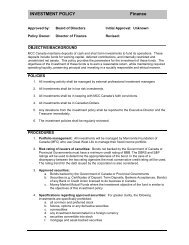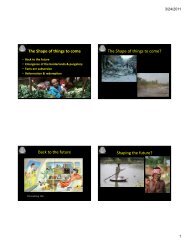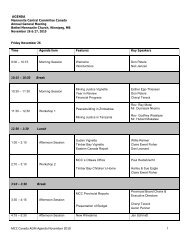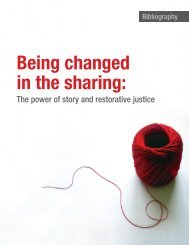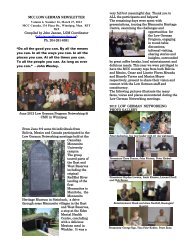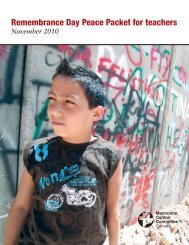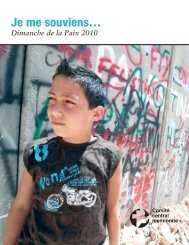Walking together: Healing and hope for Colombian refugees
Walking together: Healing and hope for Colombian refugees
Walking together: Healing and hope for Colombian refugees
You also want an ePaper? Increase the reach of your titles
YUMPU automatically turns print PDFs into web optimized ePapers that Google loves.
w a l k i n g<br />
t o g e t h e r<br />
75<br />
conversation, make a plan with the refugee <strong>for</strong> self care - what will they do to help relax <strong>and</strong> feel better<br />
after you leave? Make a plan <strong>for</strong> yourself as well.<br />
Remember to take care of yourself during <strong>and</strong> after a conversation about traumatic events. Listening to<br />
the pain of others can often have an impact on oneself. Just as you might realize that the refugee needs<br />
access to a professional counsellor at some point, be sure that you also have access to someone to talk<br />
to, such as a pastor or counsellor, if you realize that you are carrying the weight of the refugee’s story<br />
with you long after the conversation. It is normal <strong>and</strong> healthy to “debrief” after listening to the traumatic<br />
experiences of others, <strong>and</strong> this can be done in ways that respect the confidentiality of the person whose<br />
story you heard while helping ease the burden that you may be feeling.<br />
WHAT SURVIVORS WANT TO SAY TO CLERGY:<br />
A Collection of Feelings Expressed by Survivors of Trauma<br />
Originally titled What Victims Want to Say to Clergy, the following section was compiled after the Oklahoma<br />
City bombings. 23 Relatives of the victims expressed their feelings <strong>and</strong> explained what kind of responses<br />
they would appreciate receiving from pastoral support figures. Their insights <strong>and</strong> wisdom as survivors<br />
of trauma are both applicable <strong>and</strong> valuable <strong>for</strong> church communities that support survivors of refugee<br />
trauma in their path to healing.<br />
Don’t Explain: As deeply as I cry out “Why?” I know there is no rational explanation. My “Why?” is<br />
more a longing <strong>for</strong> God to hold me in His arms <strong>and</strong> give me some com<strong>for</strong>t than it is a question I want<br />
answered. I don’t want you to try to give me answers. What has happened is absurd. It is surely not as<br />
God intended life to be. It doesn’t make sense. God didn’t cause it. It could not have been God’s will.<br />
There<strong>for</strong>e, let us <strong>together</strong> try to explain the cause of the tragedy as factually <strong>and</strong> honestly as possible. I<br />
want God <strong>and</strong> you, as my spiritual leader, to be companions who will st<strong>and</strong> with me in my longing, not<br />
sources of explanation.<br />
Don’t take away my reality: My pain seems unbearable to me <strong>and</strong> yet, in light of what has happened,<br />
it feels right that I should be in pain. I know it is uncom<strong>for</strong>table <strong>for</strong> you. I know you want to take it away.<br />
But you can’t, so please don’t try. The pain is a sign to me of how much I have loved <strong>and</strong> how much I<br />
have lost. If I have doubts, if I am angry, underst<strong>and</strong> that these are normal reactions to a very abnormal<br />
situation. I will not always be like this, but I am now. These are my feelings. Please respect them.<br />
Help me deal with <strong>for</strong>giveness with integrity: Underst<strong>and</strong> that if my faith is important to me, I will<br />
struggle with the issue of <strong>for</strong>giveness. I will remember all the times I’ve been told that I must <strong>for</strong>give. And<br />
yet, something deep within me resists <strong>for</strong>giving someone who has not even said, “I am sorry.”<br />
23. Dr. Richard P. Lord, Courtesy of Colonel Jack O’Brian Poe, D. Min, Chief of Chaplains, Oklahoma City Police Department. What<br />
Victims Want to Say to Clergy. (2004) From the Strategies <strong>for</strong> Trauma Awareness <strong>and</strong> Resilience Program (STAR), Eastern<br />
Mennonite University, Virginia, USA. www.emu.edu/star



